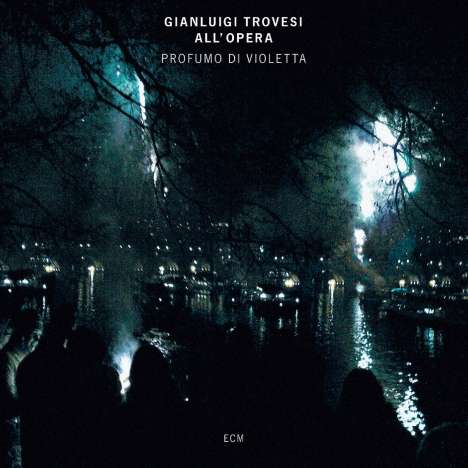Gianluigi Trovesi: Profumo Di Violetta (Trovesi All'Opera) auf CD
Profumo Di Violetta (Trovesi All'Opera)
Herkömmliche CD, die mit allen CD-Playern und Computerlaufwerken, aber auch mit den meisten SACD- oder Multiplayern abspielbar ist.
(soweit verfügbar beim Lieferanten)
- Label:
- ECM
- Aufnahmejahr ca.:
- 2006
- Artikelnummer:
- 4545003
- UPC/EAN:
- 0602517731240
- Erscheinungstermin:
- 17.10.2008
„How wonderful opera would be if there were no singers“, Rossini once exclaimed, and his colleague Claude Debussy protested that “in opera there is always too much singing”. When Gianluigi Trovesi, Italy’s great musical archaeologist and one of today’s outstanding improvisers, indulges in his old love for the drama and beauty of Italian opera he doesn’t just pick a few ever-popular hits to “sing” them on clarinet and alto saxophone, he builds an entire suite based on playfully interwoven operatic topics, encompassing the myth of Orpheus, the great festive ball, “the game of seduction”, joyous dance, and of course the inexhaustible theme of tragic jealousy. Accompanied by a fantastic “banda”, the large wind orchestra with percussion as we find it in the on-stage-music of many operas by Donizetti and Verdi, the reedman takes us on a humorous journey through the history of the genre, enriched with both light and very expressive improvisation. The trajectory leads from Monteverdi’s “Orfeo” via Pergolesi, Verdi and Mascagni to Puccini’s “Tosca”.
Both title lines carry witty double meanings: The Italian expression for “Trovesi at the opera” is equivocal with “Trovesi at work”, “Profumo di Violetta” on the other hand simultaneously alludes to the protagonist of Verdi’s “La Traviata” and to the flower’s sweet perfume – while more religious and erotic associations linger in the background. Humour and irony are paramount in “Profumo di Violetta” – an impish and charming, thoroughly Italian brand of iconoclasm that is always tinged with a strong poetic sense. This becomes evident already in the initial dawn with its musical gesture of “once upon a time at the Mediterranean”, or in Mario Cavaradossi’s march to his execution from “Tosca” where Trovesi’s clarinet gives its jazzy commentaries before the music leads back to the Te Deum from the finale of the first act. In “Trovesi all’opera”, the great intensity of Italy’s favourite art is juxtaposed with cheeky popular humour – which doesn’t exclude deep love and respect. The popular and the sublime, irony and unrestrained emotion meet in this ingenious project with an improvisational spirit that conveys the pure joy of music making.
The importance of the Banda in Italian provincial society can hardly be overstated. Recruiting its players from different milieus, these orchestras which played at all major civic and religious celebrations served as a melting pot for the social classes. In the age before the advent of the mass media, traditional Banda-repertoire, consisting of popular marches, waltzes, Neapolitan songs and – most important – operatic tunes, served as a kind of cultural memory that handed on popular musical treasures from generation to generation. Trovesi himself grew up listening to the local banda playing in the courtyards of his native village of Nembro near Bergamo. As he says in his personal introduction to the present recording, he decided to take up the clarinet as a boy when, unexpectedly, one day the regular player was missing from the orchestra.
Like most Bandas in the 20th century, “Filarmonica Mousiké” have shifted the focus of their repertoire to original contemporary compositions thus developing into a concert orchestra. It was Gianluigi Trovesi’s idea to revisit Italian opera from an unconventional angle by combining famous and lesser known tunes and including orchestral excerpts that enhance the symphonic design of the composition. While the general concepts were conceived by Trovesi, “Profumo di Violetta” is the product of an intense collaboration with the orchestra’s musicians who contributed significantly to the arrangements.
Gianluigi Trovesi, almost unchallenged amongst clarinettists in Europe, has been one of the defining figures of Italian jazz, a multiple prize-winner in his homeland since the 1970s. Membership of Giorgio Gaslini’s groups helped raise his profile but it was not until the 1990s that Trovesi began to be widely known internationally, both as the outstanding soloistic star of the Italian Instabile Orchestra (ECM album “Skies of Europe”), and leader of his own bands, particularly the Octet, which would also record for ECM. (“Fugace” by the Gianluigi Trovesi Ottetto, recorded in 2002, takes a very unorthodox look at some of the roots of early jazz). Subsequently Trovesi issued two highly successful discs with accordionist Gianni Coscia – “In cerca di cibo” and “Round about Weill”.
On his most recent release “Vaghissimo ritratto” (with Fulvio Maras and Umberto Petrin) he pulled together melodies and musical portraits from all manner of sources: Palestrina, Orlando di Lasso, Monteverdi, Josquin Des Prés, Jacques Brel, Italian pop singer Luigi Tenco, as well as pieces by the group members individually, plus collective improvising.
Pressestimmen:
To say they’ve succeeded in making wonderful music is to understate their accomplishment. Boundaries are not erased; they’re treated as if they never existed. The melding of classical techniques with jazz is wholly organic. Trovesi’s consummately modern improvisations sound completely at home in the context of his own compositions and Guarino’s arrangements, without a hint of compromise. Indeed, this is the most naturally affecting music I’ve heard in a while. Chris Kelsey, JazzTimes
Gianluigi Trovesi, wild-haired Italian jazz clarinettist, creates a turbo-charged version of a traditional Italian town band to play a medley of quirkily arranged Italian opera tunes. It includes some of Rossini’s and Verdi’s greatest hits, garlanded with Trovesi’s husky solos, plus foot-tapping Baroque dances. It’s funny, sentimental and charming. Ivan Hewett, Daily Telegraph
Trovesi’s own compositions extend and stretch the material. It is this, alongside the assured and sensitive arrangements by a clutch of hands, that give this record much of its charm. The Italian band tradition substitutes brass or woodwind for the prima donna and uomo, so this is no great leap for Trovesi. … There is a real energy and joie de vivre to this orchestra’s performance that truly lifts the music and makes this truly special. Elegant and it swings. Duncan Heining, Jazzwise
Trovesi offre le meilleur de son inspiration à la fois légère, poétique et délicieusement sarcastique, s’autorisant, dans l’écrin d’une orchestration baroque tout en éclats lyriques, les plus audacieux vagabondages instrumentaux. Stéphane Ollivier, Jazzman
(...) tratti di perfezione "Profumo di Violetta" ne ha, nel rievocare "a modo suo" pagine immortali (Monteverdi, Pergolesi, Verdi, Rossini, Mascagni, Puccini) e nelle mirabili, siano struggenti o argute, "aggiunte" di Trovesi stesso. (...) Un disco non trattenuto nei soli confini del jazz, ma davvero importante, per finezza e maestria. Gianmario Maletto, Musica Jazz
Eine frühbarocke Ciaccone trifft auf John Coltrane, ein Saltarello kommt in der Harmonik eines Thelonius Monk daher, und von irgendwo weht plötzlich Bizets “Habanera” herein. Trovesi würfelt sein Material allerdings nicht einfach zusammen, er erzählt vielmehr eine kleine Geschichte der Oper, von den Anfängen bis heute, eklektisch, ironisch, übermütig, mit verschmitzten Augen. Es ist eine sehr persönliche Geschichte, seine Geschichte. Ihre Kapitel: Prolog, Mythos, der festliche Ball, das Spiel der Verführung, Liebe, Tanz, Eifersucht, Epilog. Klingt nach Oper. Und nach prallem Leben. Ein himmlisches Vergnügen für alle. Wie sagte doch Debussy? Es muss ja nicht immer gesungen werden. Albrecht Thiemann, Opernwelt
Hier wird geseufzt, gescherzt, geschmachtet, gelitten, gealbert, mit Schmiss und Herzblut, con machismo, sentimento e gioia. Tragödie und Satyrspiel stehen sich immer nahe. … Wer glaubt, die Oper sei tot, gönne sich diese CD – das pralle Leben! Franz Cavigelli, Neue Zürcher Zeitung am Sonntag
Trovesi kommentiert und kombiniert die Melodien mit Eigenem und hat unüberhörbar seine Freude daran, mal Pergolesi in Tanzorchesterhafte kippen zu lassen oder der schwindsüchtigen Sünderin Violetta noch eine eigene Elegie zu widmen. Konzipiert als 23-teilige Suite, umgesetzt von der Filarmonica Mousiké unter der Leitung von Savino Acquaviva mit dem nötigen Gespür für das mediterrane Pathos der Vorlagen und die passende Gefälligkeit, nicht in den hochkulturellen Diskurs abzugleiten, ist Trovesi ein humorvoll unterhaltsamer Tribut … gelungen. Ralf Dombrowski, Jazzthing
Disk 1 von 1 (CD)
Profumo Di Violetta (Profumo Di Violetta)
-
1 Alba (Il Prologo)
-
2 Toccata (Il Mito)
-
3 Musa (Il Mito)
-
4 Euridice (Il Mito)
-
5 Ninfe Avernali (Il Mito)
-
6 Ritornello (Il Mito)
-
7 Frammenti Orfici (Il Mito)
-
8 Intrecciar Ciaccone (Il Ballo)
-
9 "Pur Ti Miro" (Il Gioco Delle Seduzioni)
-
10 "Stizzoso, Mio Stizzoso" (Il Gioco Delle Seduzioni)
-
11 Vespone (Il Gioco Delle Seduzioni)
-
12 Profumo Di Violetta - Part I (L'Innamoramento)
-
13 "Ah, Fors'è Lui Che l'Anima" (L'Innamoramento)
-
14 Profumo Di Violetta - Part II (L'Innamoramento)
-
15 Violetta E Le Altre (L'Innamoramento)
-
16 "? Piquillo, Un Bel Gagliardo" (Il Saltellar Gioioso)
-
17 Salterellando (Il Saltellar Gioioso)
-
18 Antico Saltarello (Il Saltellar Gioioso)
-
19 Salterello Amoroso (Il Saltellar Gioioso)
-
20 "Largo Al Factotum" (Il Saltellar Gioioso)
-
21 Aspettando Compar Alfio (La Gelosia)
-
22 "Il Cavallo Scalpita" (La Gelosia)
-
23 Così, Tosca (L'Epilogo)
Mehr von Gianluigi Trovesi
-
Gianluigi TrovesiFugaceCDAktueller Preis: EUR 14,99
-
Gianluigi TrovesiDancesCDAktueller Preis: EUR 19,99
-
Gianluigi TrovesiFrere Jacques - Round About OffenbachCDVorheriger Preis EUR 16,99, reduziert um 0%Aktueller Preis: EUR 15,99
-
Gianluigi Trovesi, Paolo Damiani & Ettore FioravantiOld And New DancesCDAktueller Preis: EUR 16,99






